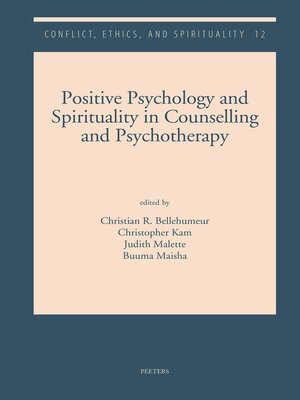Positive Psychology and Spirituality in Counselling and Psychotherapy
ebook ∣ Conflict, Ethics, and Spirituality
By C. R. Bellehumeur

Sign up to save your library
With an OverDrive account, you can save your favorite libraries for at-a-glance information about availability. Find out more about OverDrive accounts.
Find this title in Libby, the library reading app by OverDrive.



Search for a digital library with this title
Title found at these libraries:
| Library Name | Distance |
|---|---|
| Loading... |
This peer-reviewed book aims to deepen our understanding of the unique contributions of both positive psychology and spirituality to the field of mental health and psychotherapy. This integration will be covered through ten chapters that explore distinct yet complementary angles on this emerging cross pollination of psychospiritual wholeness. The co-editors have included works that offer different perspectives on this integration from the psychological, spiritual, anthropological, and ancient philosophical dimensions to empirically based views informed by contemporary research. In addition to a diversity of perspectives, a diversity of content is also explored with academic rigour. This academic resource has multiple voices singing in the choir of integration. The co-editors have conducted this symphony of twelve scholars and/or clinicians harmonizing to the tune of positive psychology and spirituality. The twelve authors come from various universities in Canada (Quebec and Ontario) and abroad (Vietnam). They also come from different ethnic and cultural backgrounds (Poland, China, the Middle East, French and English Canada etc.). This speaks to the broad intercultural diversity highlighted in many chapters. Positive Psychology and Spirituality in Counselling and Psychotherapy is divided in three parts. In the first part, four chapters present theoretical reflections and contributions from multiples frameworks. In the second part, there are three chapters on empirical research, presenting findings from diverse ethnic and cultural samples. In the third and last part, three chapters discuss some professional considerations, from micro to macro issues. The book invites researchers, students, practicing clinicians and psychotherapists as well as lay persons interested in self-help, to enjoy the complexity of the relationship between positive psychology and spirituality in the context of psychotherapy and creates the space for important professional dialogue.







